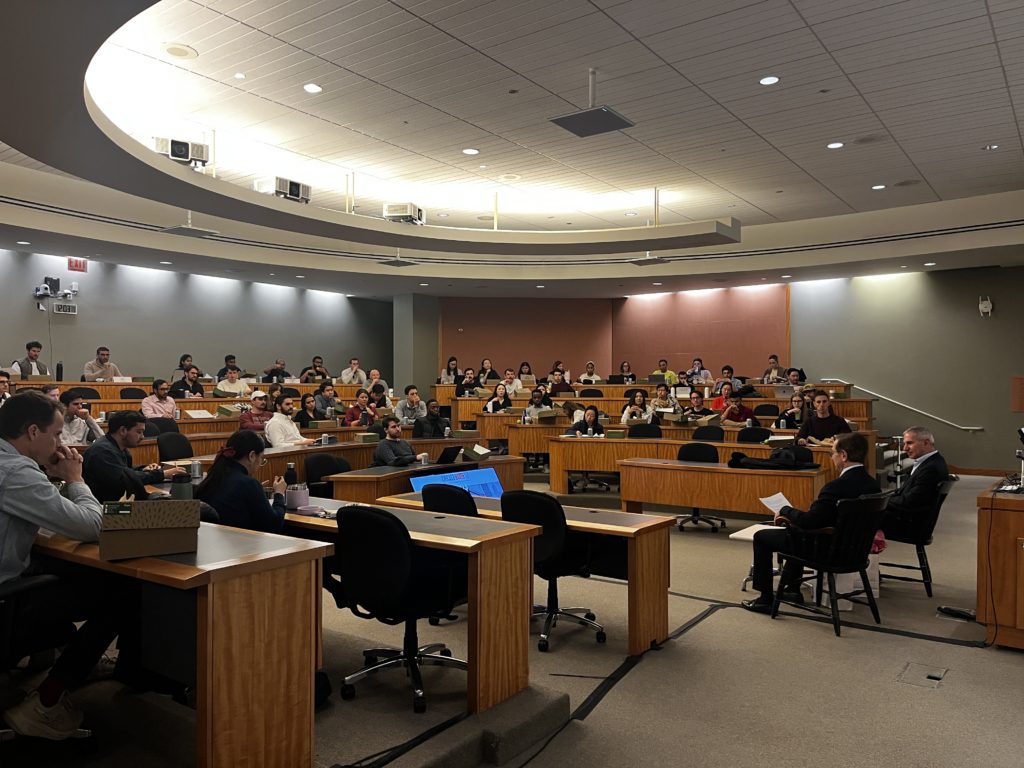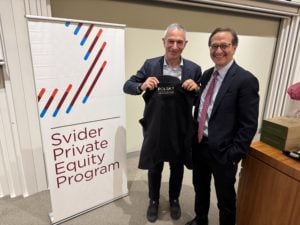Private Equity Insights: Raymond Svider Returns to Chicago Booth for Fireside Chat with Steve Kaplan

The conversation spanned from creating value in portfolio companies to the evolving impact of AI and geopolitical uncertainty on global investing.
Raymond Svider, MBA ’89, chairman and partner at BC Partners, returned to the University of Chicago Booth School of Business for a fireside chat hosted by the Polsky Center for Entrepreneurship and Innovation.
The conversation, moderated by Neubauer Family Distinguished Service Professor of Entrepreneurship and Finance and the Kessenich E.P. Faculty Director of the Polsky Center Steve Kaplan, provided students with an opportunity to hear firsthand insights from one of private equity’s most experienced leaders.
Svider, who joined BC Partners in Paris in 1992 and now chairs the global private equity firm, reflected on the firm’s nearly 40-year history, its transatlantic operations, and the investment strategies that recently earned it “Midmarket Firm of the Year” honors by Private Equity International. BC Partners currently manages more than $40 billion in private equity assets across Europe and North America, focusing on four key industry verticals.
During the conversation, Svider explained that most value creation at BC Partners stems from growth driven by operational improvements and deep integration between deal teams and specialized functional experts in areas such as pricing, go-to-market strategy, and AI.

Raymond Svider and Steve Kaplan.
When asked about how the firm evaluates management teams, Svider called out a recent shift in their approach. “We used to assess CEOs ourselves, but we recently started bringing in industrial psychologists to complement our view. It’s brought fresh perspective and been incredibly insightful,” he said.
Svider also discussed the importance of aligning leadership styles with company needs – whether leading through growth or restructuring – and the necessity of adapting their approach accordingly.
Despite recent market volatility, he expressed confidence in the long-term opportunities for private equity. “Periods of uncertainty often present some of the best times to invest,” he said, urging students not to let fear cloud judgment.
Svider also spoke to the broader evolution of the private equity industry, highlighting greater transparency, access to information, and specialization compared to when he entered the field.
“No one would have predicted this kind of growth back in the early 1990s,” he said. “But the model works. If you know what you’re doing, the field is bountiful to generate results.”
On the role of AI, he shared how BC Partners is actively working with CIOs across its portfolio to identify use cases, standardize practices, and prepare companies for future exits where AI-readiness will be important. While it’s too early to determine the full impact, Svider cited recent improvements to AI that enable associates to conduct analysis quickly.
In closing, he offered advice to students interested in entering private equity.
“Don’t pursue this because it sounds cool or promises high pay,” Svider said. “It’s demanding, uncertain, and requires more than just strong technical skills. Self-awareness, sound judgment under pressure, and a genuine passion for the work are critical.